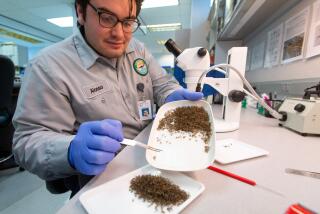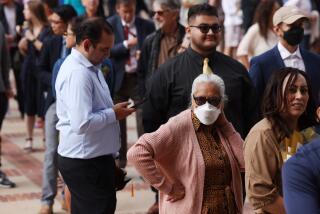18 Cases Since December : Sharp Rise Reported in L.B. AIDS Cases
- Share via
LONG BEACH — The number of AIDS cases reported in Long Beach has risen sharply since November, but health officials say the increase was expected and similar jumps are likely in the coming months.
In the past three months, 18 new cases of acquired immune deficiency syndrome have been reported in Long Beach, compared to 24 that surfaced during the previous 12 months.
Ray Kincade, coordinator of the Long Beach Health Department’s AIDS Project, said the marked upturn was expected because the number of AIDS cases has been “increasing geometrically” since the disease was identified in 1981. The number of reported cases has been doubling every six to 10 months, Kincade said.
In addition, increased surveillance efforts for AIDS in Long Beach have likely fueled the jump in reported cases, Kincade said. The department began gathering statistics in late 1983 on people afflicted with the disease.
“It’s not that startling to see a big increase,” Kincade said. “It’s to be expected. And we’re going to see other large increases.”
In the Southeast area, 20 cases have been reported since the disease was identified, according to Loran Lieb, an epidemiologist with the county Department of Health Services.
Nationwide, there have been more than 8,200 reported cases of AIDS since 1981, while 690 cases have been reported in Los Angeles County.
Kincade said many people with the disease are only now beginning to trickle in for treatment, adding to the numbers. He said there likely are a number of other cases “still waiting to be diagnosed.”
In an effort to improve diagnostic efforts in the Long Beach area, the local AIDS Project has begun sponsoring forums for interested doctors. About 25 physicians attended a meeting last week at Pacific Hospital, Kincade said.
AIDS is an incurable disease that wipes out the body’s immune system, its defense against other diseases. It generally afflicts homosexual men, users of intravenous drugs, hemophiliacs and Haitians. About 95% of the Long Beach cases are gay men, city health officials said.
Experts say AIDS is spread through the exchange of body fluids such as blood or semen. The disease typically causes death within three years. In Long Beach, 22 people have died after contracting AIDS since December, 1983.
Since the incubation period for AIDS is between six months and two years, health officials say many new cases are only now beginning to appear. The disease became a national health issue about two years ago.
“I don’t see any indications that the spread of AIDS will start slowing down soon,” Kincade said. “There are no definitive medicines or cures. There are no definitive tests that can diagnose it early on.”
Federal health officials in recent months had considered licensing a test for AIDS, but have postponed approval in part because some doctors and homosexuals contend the test is inaccurate. In addition, some gay leaders have expressed concern that use of the test could stigmatize those who take it.
More to Read
Sign up for Essential California
The most important California stories and recommendations in your inbox every morning.
You may occasionally receive promotional content from the Los Angeles Times.













